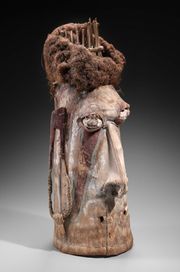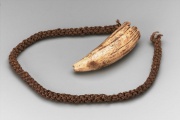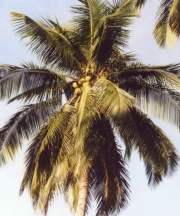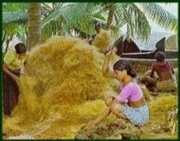Difference between revisions of "Coir"
(username removed) |
|||
| (5 intermediate revisions by 3 users not shown) | |||
| Line 1: | Line 1: | ||
| − | [[File:2002.782-SC116442.jpg|thumb| | + | [[File:Helmet mask MFA.jpg|thumb|Helmet mask <br>MFA# 2014.321]] |
| + | [[File:2002.782-SC116442.jpg|thumb|Tabua<br>MFA #: 2002.782]] | ||
== Description == | == Description == | ||
| − | Coarse, brown fibers obtained from the husks of [ | + | Coarse, brown fibers obtained from the husks of [[coconut|coconuts]] from the tropical palm, ''Cocos nucifera''. Coir is native to India and Southeast Asia where it has been used since ancient times. It was introduced to Europe by Marco Polo in the 13th century. The shell of the coconut has three distinct layers. The outer layer is thin and smooth while the inner layer contains the meat. The thick middle layer contains the coir fibers. Coir is retted from the outer shell, beaten with wooden mallets, then combed and bleached. It is a hard fiber that is durable even when wet. Coir is also wrinkle resistant and wear resistant. Its coarse, long fibers are used for brushes while the short, curly fibers are used for ropes, cording, fiber board, mats, upholstery stuffing, paint brushes, and coarse cloth. Some cocos fiber is sulfur bleached (blanca fiber) which produces an off-white, but acidic fiber. The bleached fibers may dye poorly and degrade readily. |
| − | [[File:Coconutpalmwp2.jpg|thumb|Coconut palm | + | [[File:Coconutpalmwp2.jpg|thumb|Coconut palm ''Cocos nucifera'']] |
| − | + | [[File:Coirwp2.jpg|thumb|Coir fibers]] | |
| − | ''Cocos nucifera'']] | ||
== Synonyms and Related Terms == | == Synonyms and Related Terms == | ||
kayaru; kayar; cocos fiber; coconut hair; coir fibers; blanca fiber; fibra de coco (Esp.); coir (Ned); kokosvezel (Ned) | kayaru; kayar; cocos fiber; coconut hair; coir fibers; blanca fiber; fibra de coco (Esp.); coir (Ned); kokosvezel (Ned) | ||
| − | == | + | == Physical and Chemical Properties == |
Resistant to water. | Resistant to water. | ||
| − | |||
| − | |||
| − | |||
| − | |||
== Comparisons == | == Comparisons == | ||
| Line 23: | Line 19: | ||
[[media:download_file_157.pdf|Properties of Natural Fibers]] | [[media:download_file_157.pdf|Properties of Natural Fibers]] | ||
| − | + | == Resources and Citations == | |
| − | |||
| − | == | ||
| − | |||
| − | |||
| − | |||
| − | |||
| − | |||
| − | |||
| − | |||
* Zora Sweet Pinney, 'A Handle on the Terms used for Artists' Brushes', unpublished glossary, 1999 | * Zora Sweet Pinney, 'A Handle on the Terms used for Artists' Brushes', unpublished glossary, 1999 | ||
| Line 48: | Line 35: | ||
* ''Identification of Textile Materials'', The Textile Institute, Manchester, England, 1985 | * ''Identification of Textile Materials'', The Textile Institute, Manchester, England, 1985 | ||
| − | * ''Encyclopedia Britannica'', http://www.britannica.com Comment: coconut palm" | + | * ''Encyclopedia Britannica'', http://www.britannica.com Comment: coconut palm" [Accessed September 22, 2003]. |
* Edward Reich, Carlton J. Siegler, ''Consumer Goods: How to Know and Use Them'', American Book Company, New York City, 1937 | * Edward Reich, Carlton J. Siegler, ''Consumer Goods: How to Know and Use Them'', American Book Company, New York City, 1937 | ||
Latest revision as of 14:45, 14 October 2020
Description
Coarse, brown fibers obtained from the husks of coconuts from the tropical palm, Cocos nucifera. Coir is native to India and Southeast Asia where it has been used since ancient times. It was introduced to Europe by Marco Polo in the 13th century. The shell of the coconut has three distinct layers. The outer layer is thin and smooth while the inner layer contains the meat. The thick middle layer contains the coir fibers. Coir is retted from the outer shell, beaten with wooden mallets, then combed and bleached. It is a hard fiber that is durable even when wet. Coir is also wrinkle resistant and wear resistant. Its coarse, long fibers are used for brushes while the short, curly fibers are used for ropes, cording, fiber board, mats, upholstery stuffing, paint brushes, and coarse cloth. Some cocos fiber is sulfur bleached (blanca fiber) which produces an off-white, but acidic fiber. The bleached fibers may dye poorly and degrade readily.
Synonyms and Related Terms
kayaru; kayar; cocos fiber; coconut hair; coir fibers; blanca fiber; fibra de coco (Esp.); coir (Ned); kokosvezel (Ned)
Physical and Chemical Properties
Resistant to water.
Comparisons
Resources and Citations
- Zora Sweet Pinney, 'A Handle on the Terms used for Artists' Brushes', unpublished glossary, 1999
- G.S.Brady, Materials Handbook, McGraw-Hill Book Co., New York, 1971 Comment: p. 213
- J.Gordon Cook, Handbook of Textile Fibres:I Natural Fibres, Merrow Publishing Co. , Durham, England, 1984
- Rosalie Rosso King, Textile Identification, Conservation, and Preservation, Noyes Publications, Park Ridge, NJ, 1985
- Henry Hodges, Artifacts: An Introduction to Early Materials and Technology, Ronald P. Frye, Kingston, Canada, 1988
- Marjory L. Joseph, Introductory Textile Science, Holt, Rinehart and Winston, Fort Worth, TX, 1986
- Identification of Textile Materials, The Textile Institute, Manchester, England, 1985
- Encyclopedia Britannica, http://www.britannica.com Comment: coconut palm" [Accessed September 22, 2003].
- Edward Reich, Carlton J. Siegler, Consumer Goods: How to Know and Use Them, American Book Company, New York City, 1937
- F. Kidd, Brushmaking Materials, Bristish Brush Manufacturers, London, 1957 Comment: p. 34
- Van Nostrand's Scientific Encyclopedia, Douglas M. Considine (ed.), Van Nostrand Reinhold, New York, 1976
- Random House, Webster's Encyclopedic Unabridged Dictionary of the English Language, Grammercy Book, New York, 1997
- The American Heritage Dictionary or Encarta, via Microsoft Bookshelf 98, Microsoft Corp., 1998
- Art and Architecture Thesaurus Online, http://www.getty.edu/research/tools/vocabulary/aat/, J. Paul Getty Trust, Los Angeles, 2000



